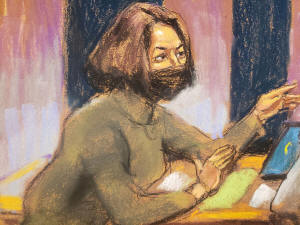Ten key moments from Ghislaine Maxwell's sex abuse trial
 Send a link to a friend
Send a link to a friend
 [December 30, 2021]
By Luc Cohen [December 30, 2021]
By Luc Cohen
NEW YORK (Reuters) - A jury on Wednesday
convicted British socialite Ghislaine Maxwell of recruiting and grooming
four teenagers for the late financier Jeffrey Epstein to sexually abuse.
Here are 10 key moments from the trial:
- In her opening statement, prosecutor Lara Pomerantz called Maxwell a
predator who manipulated girls and groomed them for abuse by Epstein,
her employer and onetime boyfriend. Maxwell saw recruiting girls for
Epstein to have sex with as a means to maintain a luxurious lifestyle,
Pomerantz said.
"They were exploiting kids," Pomerantz said. "They were trafficking kids
for sex."
- Maxwell defense lawyer Bobbi Sternheim began her opening statement by
citing the biblical story of Adam and Eve to argue that Maxwell, like
many women before her, was being blamed for a man's bad behavior.
Epstein killed himself in 2019 in a Manhattan jail cell.
"Epstein's death left a gaping hole in the pursuit of justice for many
of these women," Sternheim said. "She's filling that hole, and filling
that empty chair."
- A woman known by the pseudonym Jane testified that Epstein first
abused her in 1994, when Jane was just 14.
Maxwell sometimes took part in sexual encounters with Jane and Epstein,
and acted as if it were normal, Jane testified.
"It made me feel confused because that did not feel normal to me," she
said. "I'd never seen anything like this or felt anything like this."

- Under cross-examination by Maxwell attorney Laura Menninger, Jane
acknowledged she did not initially tell the FBI everything about
Maxwell's involvement. She said later under further questioning by
prosecutors that she was not comfortable sharing all the details.
"I was sitting in a room full of strangers and telling them the most
shameful, deepest secrets that I'd been carrying around with me my whole
life," she said.
- Prosecutors displayed for the jury a green massage table that was
seized from Epstein's Palm Beach, Florida, estate in 2005. Three of the
four accusers said they gave Epstein massages that escalated into sexual
activity.
Pomerantz called the word massage a "ruse designed to get young girls to
touch Epstein."
[to top of second column]
|

Ghislaine Maxwell confers with her lawyer Bobbi Sternheim during the
trial of Maxwell, the Jeffrey Epstein associate accused of sex
trafficking, in a courtroom sketch in New York City, U.S., December
9, 2021. REUTERS/Jane Rosenberg/File Photo

- Prosecutors showed the jury images depicting Maxwell's and Epstein's
intimate relationship during the 1990s. The never-before-seen digital
photographs showed Maxwell kissing Epstein on the cheek or rubbing his
bare foot.
- A woman known by her first name, Carolyn, testified that Maxwell once
touched Carolyn's breasts and buttocks while Carolyn was nude and told
her she had a "great body for Mr. Epstein and his friends."
"Money will not ever fix what that woman has done to me," Carolyn said,
sobbing on the stand.
- Jeffrey Pagliuca, an attorney for Maxwell, asked Carolyn why she did
not mention Maxwell in her initial discussions with law enforcement but
implicated her later in a claim to a victim's compensation fund run by
Epstein's estate. The questioning was part of Maxwell's efforts to paint
the accusers' accounts as unreliable.
"You know that if any information you submitted is false, you can be in
criminal trouble?" Pagliuca said, referring to the fund.
- Elizabeth Loftus, a prominent psychologist, testified for the defense
that people can confidently recount events that did not happen. Her
testimony was part of the defense's effort to argue that the accusers'
memories had been manipulated over time.
"When you have post-event suggestion or intervention, people get very
confident about their wrong answers," Loftus testified.
- Minutes before the defense rested its case, Maxwell stood up, and with
Sternheim's arm around her lower back, told U.S. District Judge Alison
Nathan that she was declining to testify in her own defense.
"Your honor, the government has not proven the case beyond a reasonable
doubt, and so there is no need for me to testify," Maxwell said
(Reporting by Luc Cohen in New York; Editing by Noeleen Walder and
Alistair Bell)
[© 2021 Thomson Reuters. All rights
reserved.] Copyright 2021 Reuters. All rights reserved. This material may not be published,
broadcast, rewritten or redistributed.
Thompson Reuters is solely responsible for this content. |